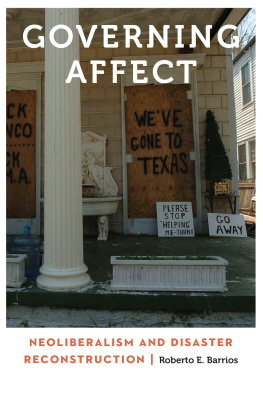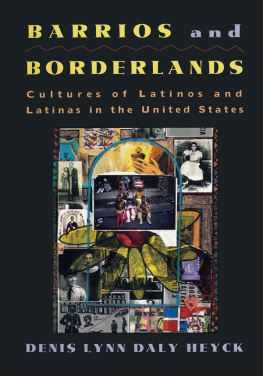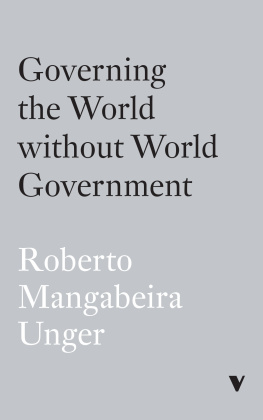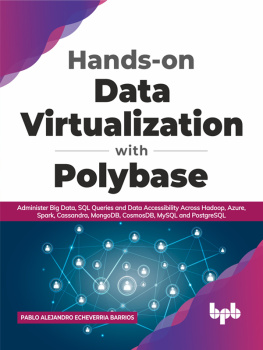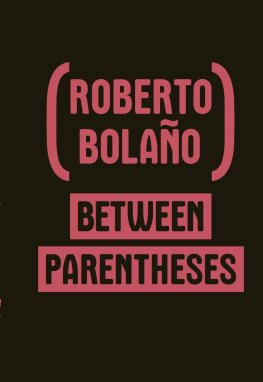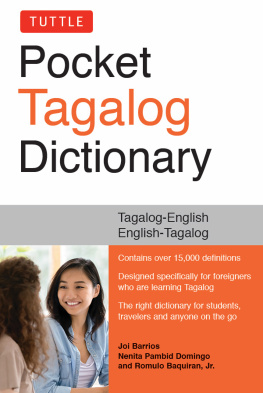Roberto E. Barrios - Governing Affect
Here you can read online Roberto E. Barrios - Governing Affect full text of the book (entire story) in english for free. Download pdf and epub, get meaning, cover and reviews about this ebook. year: 2017, publisher: University of Nebraska Press, genre: Politics. Description of the work, (preface) as well as reviews are available. Best literature library LitArk.com created for fans of good reading and offers a wide selection of genres:
Romance novel
Science fiction
Adventure
Detective
Science
History
Home and family
Prose
Art
Politics
Computer
Non-fiction
Religion
Business
Children
Humor
Choose a favorite category and find really read worthwhile books. Enjoy immersion in the world of imagination, feel the emotions of the characters or learn something new for yourself, make an fascinating discovery.
- Book:Governing Affect
- Author:
- Publisher:University of Nebraska Press
- Genre:
- Year:2017
- Rating:5 / 5
- Favourites:Add to favourites
- Your mark:
- 100
- 1
- 2
- 3
- 4
- 5
Governing Affect: summary, description and annotation
We offer to read an annotation, description, summary or preface (depends on what the author of the book "Governing Affect" wrote himself). If you haven't found the necessary information about the book — write in the comments, we will try to find it.
Governing Affect — read online for free the complete book (whole text) full work
Below is the text of the book, divided by pages. System saving the place of the last page read, allows you to conveniently read the book "Governing Affect" online for free, without having to search again every time where you left off. Put a bookmark, and you can go to the page where you finished reading at any time.
Font size:
Interval:
Bookmark:
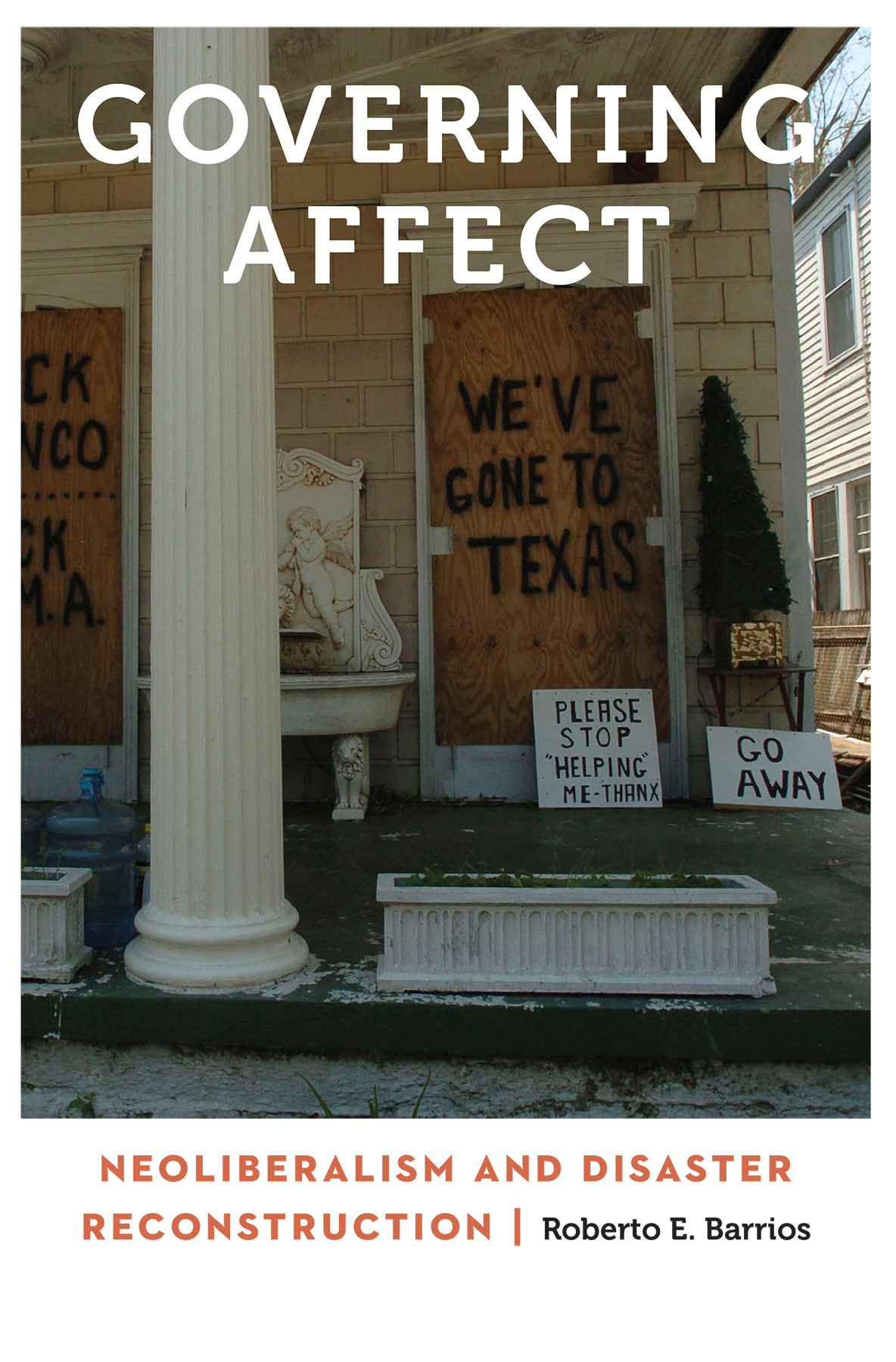
Seamlessly weaving together poststructural theory, political economy, ethnography, and personal narrative, Roberto Barrios opens new terrain for understanding why disaster reconstruction so often falls short in addressing the needs of disaster victims by failing to recognize the power of affect.
Anthony Oliver-Smith, author of The Martyred City: Death and Rebirth in the Andes
A major contribution to disaster scholarship... [and] provocative enough to provide an interesting classroom debate.
William L. Waugh Jr., coeditor of Emergency Management: Principles and Practice for Local Government, 2nd edition
In crystal clear, step-by-step prose, illuminated by four heart-wrenching examples, Roberto Barrios strips bare the ways pre- and postdisaster agencies and development schemes ignore the crucial importance of a vulnerable or devastated peoples well-being.
Susanna M. Hoffman, coeditor of The Angry Earth: Disaster in Anthropological Perspective
Anthropology of Contemporary North America
Series Editors
James Bielo, Miami University
Carrie Lane, California State University, Fullerton
Advisory Board
Peter Benson, Washington University in St. Louis
John L. Caughey, University of Maryland
Alyshia Glvez, Lehman College
Carol Greenhouse, Princeton University
John Hartigan, University of Texas
John Jackson Jr., University of Pennsylvania
Ellen Lewin, University of Iowa
Bonnie McElhinny, University of Toronto
Shalini Shankar, Northwestern University
Carol Stack, University of California, Berkeley
Roberto E. Barrios
University of Nebraska Press | Lincoln and London
2017 by the Board of Regents of the University of Nebraska
Cover designed by University of Nebraska Press; cover image AP Photo/Mark Saltz.
Chapter 3 has been revised from Here, Im Not at Ease: Anthropological Perspectives on Community Resilience, Disasters 38, no. 2 (2014): 32950. Chapter 5 has been revised from Malditos: Street Gang Subversions of National Body Politics in Central America, Identities: Global Studies in Culture and Power 16, no. 2 (2009): 179201. Chapter 6 has been revised from If You Did Not Grow Up Here, You Cannot Appreciate Living Here: Neoliberalism, Space-time, and Affect in Post-Katrina Recovery Planning, Human Organization 70, no. 2 (2011): 11827.
All rights reserved.
Library of Congress Cataloging-in-Publication Data
Names: Barrios, Roberto E., author.
Title: Governing affect: neoliberalism and disaster reconstruction / Roberto E. Barrios.
Description: Lincoln: University of Nebraska Press, 2017. | Series: Anthropology of contemporary North America | Includes bibliographical references and index.
Identifiers: LCCN 2016044827
ISBN 9780803262966 (hardback: alk. paper)
ISBN 9781496201904 (paper: alk. paper)
ISBN 9781496200143 (epub)
ISBN 9781496200150 (mobi)
ISBN 9781496200167 (pdf)
Subjects: LCSH : Disaster reliefSocial aspectsCase studies. | Natural disastersSocial aspectsCase studies. | Hurricane Mitch, 1998Social aspectsHonduras. | Disaster reliefSocial aspectsHonduras. | Hurricane Katrina, 2005Social aspectsLouisianaNew Orleans. | Disaster reliefSocial aspectsLouisianaNew Orleans. | LandslidesSocial aspectsMexicoGrijalva River Valley. | Disaster reliefSocial aspectsMexicoGrijalva River Valley. | FloodsSocial aspectsIllinoisOlive Branch. | Disaster reliefSocial aspectsIllinoisOlive Branch. | BISAC : SOCIAL SCIENCE / Anthropology / Cultural. | NATURE / Natural Disasters.
Classification: LCC HV 553 . B 365 2017 | DDC 363.34/8dc23
LC record available at https://lccn.loc.gov/2016044827
The publisher does not have any control over and does not assume any responsibility for author or third-party websites or their content.
For Teresa and Everardo
This book and my career as an anthropologist would not have been possible were it not for a number of people who supported and educated me over the course of four decades of life. First among these people are my parents, Mara Teresa Castellanos Pasarelli and Domingo Everardo Barrios Daz, who made tremendous sacrifices to provide me with the resources and experiences that shaped me as a person and as a professional social scientist. Academics, of course, also have scholarly families, and I am forever indebted to the educators and researchers who encouraged me to pursue anthropology as a field of study. At the University of New Orleans, Malcolm Webb, Ethelyn Orso, Richard Shenkel, and Richard Beavers all played key roles in my mentorship and encouraged me to pursue a graduate degree in anthropology. At the University of Florida, Anthony Oliver-Smith, James P. Stansbury, Allan F. Burns, Lynette Norr, and Stacey Langwick were instrumental in guiding me to develop an interest in applied anthropology, the anthropology of disasters, and the anthropology of development, as well as providing me with the means necessary to complete my graduate training and dissertation research.
My graduate development would not have been the same were it not for a number of fellow students who volunteered their friendships and developing professional expertise, among whom I count Lauren Fordyce, Debra Rodman, Jennifer Hale-Gallardo, Sarah Graddy, Antonio de la Pea, and Robert Freeman. The ideas and research interests I developed in graduate school also came to fruition over the course of my postdoctoral employment as an assistant professor at Southern Illinois UniversityCarbondale ( SIUC ), where a number of colleagues fostered the development of this book through casual conversations and helpful critiques. I am particularly indebted to Janet Fuller, Anthony K. Webster, Jonathan D. Hill, David Sutton, John McCall, Ren Francisco Poitevin, and Robert Swenson for making me a part of their intellectual communities and supporting my professional advancement.
Beyond the hallways of my home academic institution, I am also grateful to a number of fellow anthropologists who provided keen commentaries on my work that greatly enhanced the ways I think about post-catastrophe reconstruction. I am particularly grateful in this regard to Susanna Hoffman, Michele Gamburd, Mark Schuller, Faye Harrison, Katherine Browne, Rachel Breunlin, Helen Regis, Antoinette Jackson, David Beriss, Jeffrey Ehrenreich, Jesus Manuel Macas, Tang Yun, Zhang Yuan, AJ Faas, Gregory Button, and the two anonymous reviewers whose insights and recommendations greatly improved this manuscript. I would also like to thank James Bielo, Carrie Lane, Alicia Christensen, Sara Springsteen, and Vicki Chamlee at the University of Nebraska Press, who believed in and supported this book project.
The research upon which this book is based became possible through the kindness and hard work of a number of people who opened their homes, communities, and research sites to me. In Honduras, I was assisted by Marco Tulio Medina, Rosa Palencia, Carlos Giacoletti, Maria Fiallos, Myrna Portillo, and hundreds of disaster-displaced families who, despite the hardships brought about by forceful displacement and resettlement, always found time to share their life stories and thoughts with me. In New Orleans, Cheryl Austin, Jeanell Holmes, and Isabel Barrios Sherwood were instrumental in helping me understand life in the city before and after Hurricane Katrina. Qiaoyun Zhang, a graduate student from the SIUC Department of Anthropology, also contributed to my research efforts in southeastern Louisiana. In southern Illinois, Heather McIlvane-Newsad and David Casagrande were incredibly kind in inviting me to collaborate on their work on community resettlement and sharing their wealth of ethnographic data. I was also fortunate to be assisted by two undergraduate students, Katherine Ray and Christopher Higgerson. In Mexico, I remain indebted to Asuncin Avendao Garca, Roberto Melville, Virginia Garca Acosta, and the Centro de Investigaciones y Estudios Superiores en Antropologa Social (Center for Research and Advanced Studies in Social Anthropology) for their hospitality and guidance. My ethnographic fieldwork was also facilitated by the Fulbright Institute of International Education program (which funded my dissertation research), the National Science Foundation (which assisted me in Honduras via a senior grant awarded to James P. Stansbury and Anthony Oliver-Smith), and the SIUC Faculty Seed Grant (which supported my work in New Orleans). Finally, I am eternally grateful to Kelly McGuire, who has been a friend and partner through this two-decade endeavor.
Font size:
Interval:
Bookmark:
Similar books «Governing Affect»
Look at similar books to Governing Affect. We have selected literature similar in name and meaning in the hope of providing readers with more options to find new, interesting, not yet read works.
Discussion, reviews of the book Governing Affect and just readers' own opinions. Leave your comments, write what you think about the work, its meaning or the main characters. Specify what exactly you liked and what you didn't like, and why you think so.

